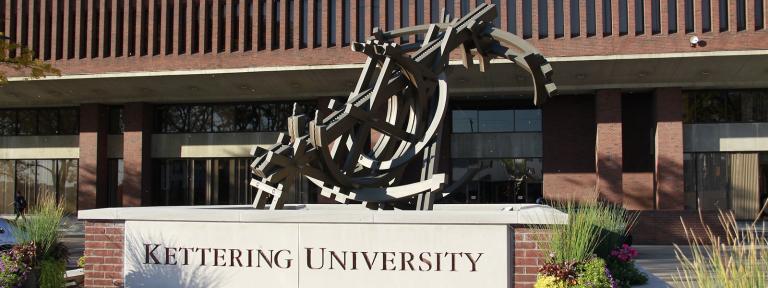
Kettering student Nick Pidek’s passion is music. Thanks to the versatility of Kettering’s co-op program, he’s been able to apply what he’s been learning as a senior on Kettering’s Business Program in a unique co-op as his own boss managing his band, sosaveme.
Pidek has been playing music with the band’s drummer, Jonathan Moore, since the year 2000. Another band member, Justin Ozanich, joined the band in 2005 and the current bassist, Austin Germain, joined the group in 2009. Although Pidek and the band have a long history of performing together and have always grown more mindful of ways to create revenue, reduce expenses and make good use of resources over the years, Pidek’s co-op made him the band’s manager, a different role for both him and the others in the band.
“The skills that I’m learning just specifically applied to the band are things that will stick with me for the rest of my career, no matter the industry,” Pidek said. “It’s difficult to be a friend of someone and then take off that hat and be a manager. That’s a difficult thing to do and I don’t think a lot of people realize the complexities of that situation and the mutual respect that has to be there.”
As band manager, Pidek has to be mindful of both immediate and big picture planning. He runs the accounting and financial aspects of the band, tour planning, appearance booking and marketing. He has to schedule practice time, manage any conflicts that could arise within the group or when it comes to dealing with contracts at venues they perform at. He delegates tasks to other band members, such as designating an equipment manager who is in charge of taking inventory of all equipment, ensuring it is in working order and makes sure it all arrives and is set up properly prior to performances.
These responsibilities are in addition to the creative aspect of being in a band, writing and creating music.
“Most people, when they approach me and find out the band is my co-op, they think that I’m just someone who gets to just get up on stage and play music,” Pidek said. “People don’t understand sometimes that even though art is an important aspect – and it totally is, you have to have a great business model, but if you have bad songs or a bad product, no one is going to listen and you won’t have anything to sell – but what people don’t tend to realize is it’s one thing to make art, it’s another thing to sell art.”
In order to get his own co-op, Pidek had to present his idea to Kettering’s co-op office and give an actual business plan as to how managing his own band would be a viable, legitimate experience.
“I went to them and just created a good argument about why it would be beneficial, what I wanted to learn from it, what I wanted to accomplish and how it would apply to what I was already learning in the business program,” he said.
Since he can’t fill out his own co-op evaluations as his own boss, Neil Sheridan from Kettering University TechWorks is his co-op supervisor. During his co-op term, Pidek meets with Sheridan and presents both data and future planning goals. Sheridan then offers feedback or suggestions.
Because of his class schedule, Pidek has to plan his time with the band strategically.
“Logistically we have about six months a year to do extensive touring,” he said. “When I’m in school, it’s impossible to tour because the rigor of classes, missing an entire week is definitely out of the question.”
They do weekend shows while Pidek is taking classes to keep some revenue coming in and keep fans engaged. During school, Pidek focuses more on marketing the band, doing interviews, building content on their website and other promotional materials. Then, when he does have time to tour extensively, the band performs at music festivals, plans studio time to record new albums and focuses on accomplishing things that require more time to complete.
“One of the downsides to doing your own co-op is you can’t turn it off,” he said. “So when I’m in school, I’m still thinking about and running the business side of the band to keep it going. I have to go home and still practice and plan for the summer and touring but also keep up with classes.”
This summer, the band will be performing at the Ichthus Festival in Wilmore, Kent., June 17 and at the Big Ticket Festival in Ionia, Mich., June 23. They also recently began recording their new full-length album, ‘The Garden.’
Pidek’s co-op experience has reinforced his beliefs that smart management can enhance the experience of playing in a band.
“What I’ve learned is that the capability to make a living and a lifestyle out of music isn’t as far-fetched as you think. The huge bands like Kings of Leon or Coldplay, they’re a very small percentage of the music industry,” he said. “There are bands that never make it huge mainstream, but they still perform until they’re in their 40s or 50s because they’ve created some sort of business model so they can get married, sustain families and make a living. In our particular market and scene as an independent band, we have a huge leg up because we’re thinking about things that record labels are thinking about and mainstream management companies are interested in like marketing, sale of merchandise, presentation, visual rhetoric and all of these things. They were things that I knew about some before, but the environment here at Kettering helped me think about them more in depth and how they applied to the band.”
For more information about sosaveme, visit sosaveme.com, facebook.com/sosaveme, twitter.com/sosaveme or myspace.com/sosaveme.
Contact: Patrick Hayes
phayes@kettering.edu
(810) 762-9538